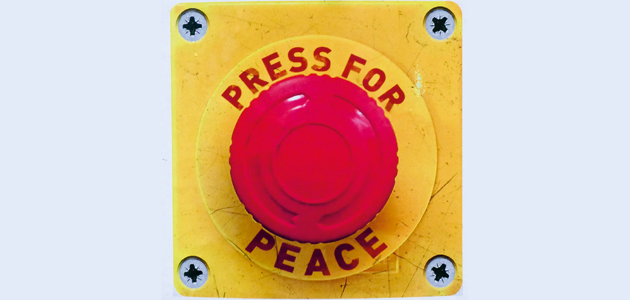Safe keeping: Joanna Dales’s Thought for the week
‘We can practise now for the kingdom of peace.’

Peace I leave with you; my peace I give to you. I do not give to you as the world gives’ (John 14:27).
I used to think these words referred to an inner peace, transcending outward turbulence. I have come to see, however, that they may also refer to an outward peace, just one that is not ‘as the world gives’.
Britain has not experienced war within its borders for nearly eighty years, but this is peace ‘as the world gives’: it relies on a standing army and stockpiles of deadly weapons, and on alliances with powers similarly armed. It has nothing to do with the teaching of Jesus.
Northern Friends Peace Board is currently urging us to ‘rethink security’. Some of its members have recently demonstrated against the sale of weaponry at the DSEI arms fair, believing that weaponry threatens, rather than enhances, national security. Most Quakers support this action; many support the Campaign Against the Arms Trade, and we hate nuclear weapons. We would like to think that ‘security’ can be based on mutual trust and respect, where diplomacy, not the use or threat of force, settles differences. But how far are we prepared to go? We defend our national borders against armed invaders, but also against innocent people fleeing danger or hunger. Is there a better way?
We live in a rich country. That is why people want to come to Britain, but it is also why we want to keep them out: we are afraid of losing our comfortable way of life, which we nevertheless present as the goal for all to aspire to. Nationalism – a pride in what we consider our special qualities and values – can be invoked to support the idea of a fortress nation. But greed, and fear of dispossession, sits underneath all this. If we were to embrace the peace that Christ offers, we would open our borders, share our possessions, and perhaps even give up thinking of ourselves as belonging to a nation state – instead to all humankind. We may still cherish our native landscape and culture, but we should think of these not in terms of what we own, but what we can offer. We must make ourselves vulnerable.
Such is the politics of the Sermon on the Mount. They are impracticable. Most of us are not likely to begin giving our tunic to whoever takes our cloak. But we will not attain true, lasting peace without such impracticable politics.
We can practise now for the kingdom of peace: protesting against the trade in arms, welcoming refugees, and giving of our time and substance to the needy. As the poet RS Thomas assures us in ‘The Kingdom’:
It’s a long way off, but to get
There takes no time and admission
Is free, if you will purge yourself
Of desire, and present yourself with
Your need only and the simple offering
Of your faith, green as a leaf.
You need to login to read subscriber-only content and/or comment on articles.
